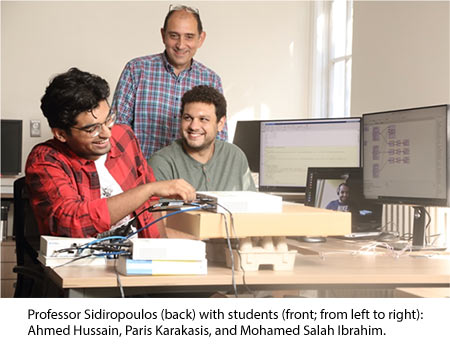SPS Pioneers in IEEE History: Prof. Nikolaos (Nikos) Sidiropoulos

 Prof. Nikolaos (Nikos) Sidiropoulos is the Louis T. Rader Professor of Electrical and Computer Engineering at the University of Virginia. He earned his Ph.D. in Electrical Engineering from the University of Maryland–College Park, in 1992. He has also served on the faculty of the University of Minnesota, and the Technical University of Crete, Greece. His research interests are in signal processing, communications, optimization, tensor decomposition, and factor analysis, with applications in machine learning and communications. He received the NSF/CAREER award in 1998, the IEEE Signal Processing Society (SPS) Best Paper Award in 2001, 2007, 2011, and 2023, and his students received four IEEE SPS conference best paper awards. Professor Sidiropoulos has authored a Google Scholar Classic Paper in Signal Processing (on multicast beamforming), and his tutorial on tensor decomposition won the 2023 Donald Fink Overview Paper Award and is one of the most frequently accessed TSP papers in IEEE Xplore. He served as IEEE SPS Distinguished Lecturer (2008-2009), Vice President of IEEE SPS (2017-2019), and as chair of the IEEE Fellow evaluation committee of SPS (2020-2021). He received the 2010 IEEE Signal Processing Society Meritorious Service Award, and the 2013 Distinguished Alumni Award from the ECE Department of the University of Maryland. He is a Fellow of IEEE (2009) and a Fellow of EURASIP (2014). He received the EURASIP Technical Achievement Award in 2022, and the IEEE SPS Claude Shannon - Harry Nyquist Technical Achievement Award in 2023.
Prof. Nikolaos (Nikos) Sidiropoulos is the Louis T. Rader Professor of Electrical and Computer Engineering at the University of Virginia. He earned his Ph.D. in Electrical Engineering from the University of Maryland–College Park, in 1992. He has also served on the faculty of the University of Minnesota, and the Technical University of Crete, Greece. His research interests are in signal processing, communications, optimization, tensor decomposition, and factor analysis, with applications in machine learning and communications. He received the NSF/CAREER award in 1998, the IEEE Signal Processing Society (SPS) Best Paper Award in 2001, 2007, 2011, and 2023, and his students received four IEEE SPS conference best paper awards. Professor Sidiropoulos has authored a Google Scholar Classic Paper in Signal Processing (on multicast beamforming), and his tutorial on tensor decomposition won the 2023 Donald Fink Overview Paper Award and is one of the most frequently accessed TSP papers in IEEE Xplore. He served as IEEE SPS Distinguished Lecturer (2008-2009), Vice President of IEEE SPS (2017-2019), and as chair of the IEEE Fellow evaluation committee of SPS (2020-2021). He received the 2010 IEEE Signal Processing Society Meritorious Service Award, and the 2013 Distinguished Alumni Award from the ECE Department of the University of Maryland. He is a Fellow of IEEE (2009) and a Fellow of EURASIP (2014). He received the EURASIP Technical Achievement Award in 2022, and the IEEE SPS Claude Shannon - Harry Nyquist Technical Achievement Award in 2023.
We approached Nikos Sidiropoulos with a few questions, to learn more!
1. What have been the most important factors in your career path?
The most important factors were people. A friend's father, who noticed my curiosity, made, and gave me a tiny FM transmitter when I was 12 years old. Several of my teachers, who pushed us to learn more. My PhD advisor John Baras, from whom I learned to be fearless. Christos Faloutsos, who taught me the value of cross-disciplinary collaboration early on. Georgios Giannakis, who foresaw my potential and became an early mentor and great supporter throughout my career. Rasmus Bro, who had the biggest influence on my thinking -- he is a chemist and food technologist and MATLAB and life and work aficionado who taught me all I needed to know about tensors as we were writing other (seemingly irrelevant) papers together, and forced me to drop C and start using MATLAB in the early-mid 90's. My wife Lela above all -- without her love and tremendous support I wouldn’t have the career I had for sure.
2. What were the main theoretical changes in your field during the last 20-30 years?
I think the greatest theoretical change has been in terms of better connecting signal processing theory to signal processing practice. The practical side of signal processing has always been there and driving innovations in some areas, such as speech and image/video compression, but a good part of signal processing was about academic problems with little direct impact on applications. This has changed in the last 15 years, as more interesting datasets have become widely available and there has been a cultural shift towards theory for real-world applications, including careful experiments to corroborate the theory using real data. On the other hand, we are now seeing a reverse trend as more and more publications in theoretical machine learning shy away from even cursory experimental / numerical validation.
3. What are a few of the main technological and practical issues that have been addressed since the beginning of your career?
We have made great strides in supervised learning and in conceding that neural networks can work marvels given enough good data. The progress of interactive language models is mind-boggling, despite the inevitable present-day limitations. On the other hand, the realism of images produced by neural generative models, the deep fakes ... makes me skeptical about where all this is going, and whether we are investing / directing our energy and resources to meet the greatest needs of humanity.
4. In your opinion, what are some of the most exciting areas of research for students and upcoming researchers?
New theory, methods, and signal processing algorithms for multimodal learning, including AI expert models in health care, new drug and therapy development, and clinical trial optimization. New signal processing theory and methods that open up the black box of deep learning and related methods, such as transformers and the role of attention, for example. Can we think about these systems `out of the box'? Can we explain them in terms of disciplined theory and method? Can we use AI to solve hard computational signal processing problems? Can we understand human emotions and the human brain?
5. If there is one take home message you want the readers of this interview to have, what would it be?
Think big, think bold and trust your instinct. No one ever broke new ground by following the crowd. Ingenious out-of-the-box ideas are often met with skepticism and have a hard time rising to the surface, but they eventually do. You can hedge your risk in the meantime by also doing some less unconventional work, but never give up on what you are passionate and convinced about. It will eventually be appreciated, and that will be your legacy.
6. How do you envision the role of signal processing in the future of technology?
I often say that signal processing does not have a constitutional mission, like communications engineering does for example. Signal processing researchers have always been mathematically inclined matchmakers, knowing enough linear algebra, transform theory, optimization, probability and statistics, algorithms, and engineering to make magic happen. We are not *the* experts in any one of our founding disciplines, but we are well prepared for the 'aha moment' that puts all the pieces of the puzzle together. Signal processing will continue to be a polyglot field of poly-technically educated engineers at the forefront of modern technology.

